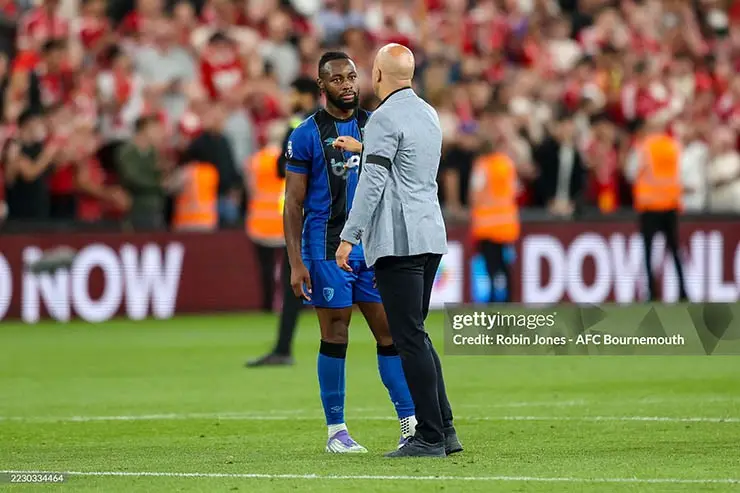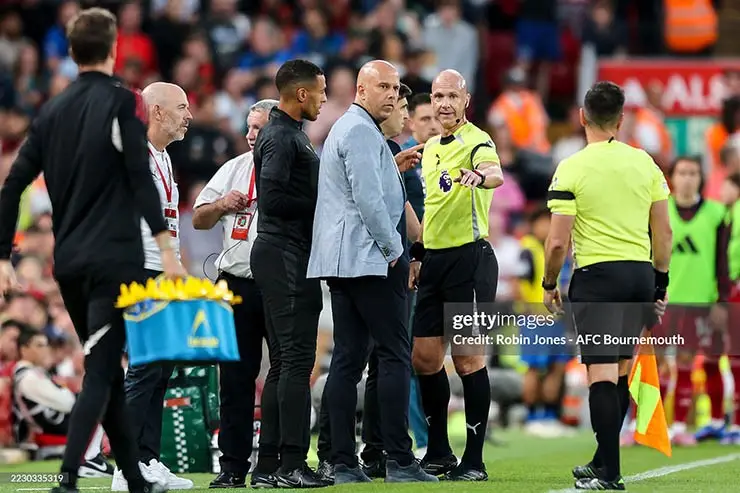In the world of English football, incidents of racism remain a pressing concern that threaten the integrity and unity of the sport. The debut match of EPL 2025-2026 between Liverpool and Bournemouth at Anfield became a stark reminder of this ongoing issue when a racist incident interrupted what was supposed to be a celebration of football’s best qualities. This event not only highlighted the persistence of racism in society but also prompted urgent questions about collective responsibility, regulations, and the pace of cultural change within the sport. As football is a mirror of society, tackling racism on and off the pitch remains a critical challenge.
The incident was not merely an isolated event; it sent ripples through the football community worldwide. It underscored the need for robust mechanisms to combat racism in the sport, emphasizing that complacency and denial are no longer acceptable. The Liverpool vs. Bournemouth match shifted from a sporting event to a symbol of the ongoing battle against racism, emphasizing that for football to truly be a global game of inclusion, all stakeholders must collaborate with unwavering resolve. This event serves as an eye-opening case study on how deeply rooted racism still is and calls for renewed commitments at every level of EPL 2025-2026 and beyond.
In this comprehensive analysis, we will explore the event’s aftermath, societal impacts, policy responses, community efforts, and the lessons learned. The incident revealed many not only about racism as a societal malaise but also the resilience and adaptability of football’s governing bodies. It is crucial to dissect what this means for the future of English football, the strategies necessary to fight racism, and how a unified front can turn adversity into momentum for long-lasting change.

Liverpool’s Thrilling EPL 2025-2026 Opener Sparks Excitement with 6-Goal
The Consequences and Reactions of Involved Parties
The immediate aftermath of the racism incident during the Liverpool vs. Bournemouth match was charged with emotion and urgency. The referee, Anthony Taylor, made the decision to pause the game to address the unacceptable behavior, exemplifying a zero-tolerance stance toward racism. This swift reaction was supported by the Premier League, which issued official statements condemning the act and pledging to investigate thoroughly. It was a display of accountability, signaling to fans, players, and stakeholders that racism will not be tolerated within the league, regardless of the circumstances.
Players, coaches, and officials also responded publicly, making powerful statements condemning the behavior and reaffirming their commitment to equality and respect. Liverpool’s management, in particular, took a strong stance, with the club’s leadership promising to support racial sensitivity initiatives and to work closely with authorities to ensure justice. Meanwhile, Bournemouth’s squad, with some players visibly upset, used their platform to voice their opposition. These reactions highlighted the increasing awareness among football professionals that combating racism is a collective responsibility, not just a matter of individual conduct.
On a broader level, fans around the world voiced outrage and support for the anti-racism movement. Many used social media to demand stricter penalties and better education to prevent future incidents. Such widespread reactions reflect an understanding budding within the football community that racism diminishes the integrity of the sport and undermines its fundamental values. This incident has driven home the need for comprehensive measures to address such misconduct at every level, reinforcing that the fight against racism must be relentless and multifaceted in EPL 2025-2026.

The Impact of the Incident on Premier League’s Image
The interruption of the Liverpool versus Bournemouth game due to racism cast a shadow over the reputation of the Premier League—one of the world’s most lucrative and popular football leagues. While the league’s quick and firm response demonstrated a commitment to upholding sportsmanship, the incident nonetheless exposed vulnerabilities in fan behavior and league oversight. Internationally, this event generated negative headlines, putting pressure on the league to reaffirm its stance and take meaningful action to prevent recurrence.
This situation revealed that despite ongoing efforts to combat racism, deep-seated prejudices still pervade sections of the audience and, at times, threaten the league’s global standing. For many viewers outside the UK, incidents like this threaten to tarnish EPL’s image as an inclusive and elite competition. Sponsorships, broadcasting contracts, and international partnerships rely heavily on the league’s reputation. Any perception of indifference or insufficient action regarding racism could jeopardize these relationships, making it imperative for the Premier League to show leadership through transparency, education, and enforcement.
Moreover, the incident fuelled a broader debate about fan culture, moderation, and technological solutions such as fan identification and behavior tracking. It also prompted calls to emphasize fan education and zero-tolerance policies during matches. Ultimately, despite the negative optics, the league’s handling of the situation offers a chance for EPL to demonstrate leadership and rebuild trust by adopting comprehensive reform strategies that address the root causes of racism while actively promoting diversity and tolerance.
The Actions Taken by the Premier League and the Future of English Football
In response to the incident, the Premier League swiftly announced a series of initiatives aimed at eradicating racism from stadiums and sidelines. These include strengthening monitoring and surveillance during matches, expanding educational campaigns targeting fans, players, and staff, and introducing stricter punishments for offenders. The league’s leadership reaffirmed its commitment to creating a safe, inclusive environment, signaling that racism has no place in EPL 2025-2026 or future seasons.
Furthermore, the league has pledged to support offenders’ rehabilitation and to collaborate with anti-racism organizations, ensuring ongoing awareness and accountability. Innovative technologies such as AI-powered hate speech detection and fan behavior analysis will be integrated into match-day systems to identify and prevent unacceptable conduct swiftly. Moving forward, this incident serves as a catalyst for a broader cultural shift within English football, with expectations for more proactive policies that combine enforcement with education.
The future of English football hinges on sustained efforts to tackle racism comprehensively. The league’s responses will likely shape policy models for other sports and leagues globally, setting benchmarks for swift action and profound cultural change. The incident at Anfield underscores the importance of resilience, continuous reform, and stakeholder engagement, emphasizing that fighting racism is an ongoing journey that requires collective effort. EPL can become a much stronger and more inclusive league with strategic, sustained reforms grounded in transparency and community involvement.
Anti-Racism Policies and Measures by the FA
The Football Association (FA) has recognized that fighting racism requires systemic change supplemented by practical policies. Over recent years, it intensified efforts to establish a comprehensive anti-racism framework, including mandatory diversity training for players, staff, and officials. These policies aim to foster a culture of respect, understanding, and accountability across all levels of English football, emphasizing that change begins not just from regulation but from education and empathy.
Following the incident at Anfield, the FA announced additional initiatives, such as increased reporting channels for racial incidents, anonymous helplines for players and staff, and community outreach programs. These measures are designed to create safer environments where victims of racism feel empowered and supported. The FA also committed to transparency in investigations and penalties, ensuring consistent consequences for offenders to deter future misconduct.
Furthermore, collaboration with organizations like Kick It Out and Show Racism the Red Card reflects an integrated approach to tackling racism that revolves around education, prevention, and community participation. These partnerships help embed anti-racism principles into grassroots programs, spotlighting the importance of cultivating empathy within fan culture and youth development. In the long run, a multi-layered strategy blending regulation with proactive engagement offers the most promise for fostering a genuinely inclusive football landscape.
Collective Efforts by Clubs and Fans to Combat Racism
Clubs across English football, including prominent sides like Liverpool and Bournemouth, have taken visible stances against racism. Many have launched campaigns, educational initiatives, and community outreach programs designed to promote diversity and challenge prejudiced behaviors. Players and coaching staff regularly participate in anti-racist protests, wear symbols of solidarity, and voice their opposition to any form of discrimination, emphasizing that football belongs to everyone regardless of race.
The Liverpool incident catalyzed a wave of fan activism, with supporter groups forming alliances to combat racism actively. Several clubs implemented fan education programs that aim to inform attendees about the damage caused by racism and foster a culture of zero tolerance. These grassroots efforts, combined with high-profile campaigns such as
Despite the gains, challenges persist, especially in halting the normalization of subtle forms of prejudice in fan behavior. The long-term success of these strategies depends on ongoing dialogue, strict enforcement, and support from players, clubs, and governing bodies. By working collaboratively, the football community can send a powerful message that racism has no place in the sport and insist that EPL 2025-2026 be remembered not for its incidents but for its strides toward an inclusive future.
Long-Term Impacts and Lessons from the Anfield Incident
The disturbance caused by racism during the Liverpool versus Bournemouth game marked a pivotal moment for English football. It underscored the urgency of deep societal change, revealing that superficial measures aren’t enough. As such, the incident acts as a catalyst for institutional reforms, community engagement, and a reinvigorated commitment to diversity. It’s a sobering reminder that racism can erupt unexpectedly and cause damage to both the sport’s reputation and its social fabric.
A critical lesson is that combating racism isn’t solely the responsibility of league authorities; it is a task shared across clubs, fans, players, and society at large. The event highlights the importance of developing comprehensive policies that go beyond punishment to include education, prevention, and reconciliation strategies. The long-term impact of these initiatives can foster a more resilient, tolerant, and united football community—one capable of addressing prejudice before it manifests into damaging encounters.
This incident should serve as a stepping stone for systemic change rather than an isolated episode of controversy. By learning from such moments, English football has an opportunity to lead by example worldwide. The comprehensive response, transparency, and community-oriented measures demonstrated in the aftermath of the Anfield incident will determine whether the sport can turn this crisis into a catalyst for lasting progress. The ongoing journey toward racism awareness and suppression must be relentless if the sport is to truly champion equality.
Raising Awareness and Educating Fans and the Community
A significant aspect of combating racism lies in education—shaping attitudes and beliefs that underpin fan behaviors and societal perceptions. The incident at Anfield exposed gaps in awareness, emphasizing that many fans still lack a clear understanding of the damaging effects of racism and the importance of diversity. Therefore, targeted campaigns involving multimedia content, workshops, and stadium-based activities are vital tools for fostering empathy and cultural sensitivity.
Clubs and community organizations have stepped up efforts to incorporate anti-racism education into their programs. Interactive sessions, inclusive storytelling, and collaborations with schools and local groups serve to challenge prejudices from a young age. This approach helps embed core values of respect and equality into the culture of football supporters, ensuring that future generations grow up with stronger anti-discrimination attitudes. Such grassroots level work is essential for sustainable change in EPL 2025-2026 and beyond.
Furthermore, leveraging influential players and high-profile matches to promote messages of unity adds powerful resonance to awareness campaigns. Visibility of anti-racism symbols and stories during major fixtures can inspire fans to reflect, oppose, and speak out against intolerance. The key is to make education ongoing, engaging, and relevant—transforming knowledge into action—so that racism becomes a topic of the past within football communities.
Improving Institutional Policies and Incident Response Processes
The Liverpool incident underscored the necessity for continuous refinement of anti-racism policies and procedures. Given the volatility and unpredictability of fan misconduct, institutions must develop adaptable, technology-enabled, and robust systems for managing incidents. This includes clearer channels for reporting, faster investigative processes, and transparent disciplinary measures that send a clear message that racism will be met with zero tolerance.
Effective change also requires partnership across agencies—clubs, governing bodies, law enforcement, and anti-discrimination organizations—to create seamless protocols. Implementing pre-emptive measures like stadium zoning, better surveillance, and real-time behavior monitoring can help prevent incidents before they escalate. Equally important is ensuring that victims feel safe and supported when reporting abuse, which encourages accountability and community engagement.
A comprehensive reform process involves training staff and volunteers regularly on recognizing subtle forms of racism, maintaining vigilance, and applying consistent sanctions. By continually evaluating and improving these systems based on emerging challenges and technological advancements, the league and clubs can cultivate a culture of proactive prevention, significantly reducing the likelihood of future occurrences and safeguarding the sport’s integrity for EPL 2025-2026 and years ahead.
Conclusion
The racism incident during the Liverpool vs. Bournemouth match at Anfield has served as a stark wake-up call for English football, exposing vulnerabilities but also illuminating opportunities for transformative change. It demonstrated the urgent need for comprehensive policies, proactive education, community involvement, and technological innovations to eradicate prejudice on and off the pitch. The league’s swift reaction, combined with ongoing efforts by clubs, fans, and authorities, illustrates a collective willingness to address this deeply rooted issue. Moving forward, sustained commitment and a culture of zero tolerance must be maintained to ensure that racism no longer finds space in football’s glorious future. The incident should be remembered not just as a moment of disgrace but as a catalyst for greater awareness, inclusion, and justice within the sport, inspiring efforts that will shape EPL and global football for generations to come.

